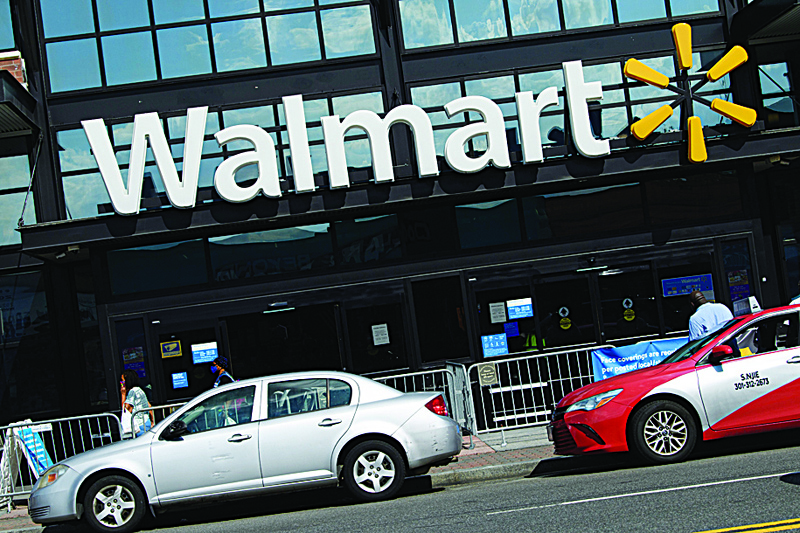

NEW YORK: Walmart saw its profits jump in latest quarter as e-commerce sales surged during the coronavirus pandemic and US government stimulus payments boosted spending, the company reported Tuesday. And executives said the retail behemoth made progress in addressing shortages of cleaning supplies and grocery staples that sold out in the early days of the pandemic.
But Walmart did not provide full-year profit targets and executives said the outlook remained clouded by the unpredictable course of the virus and whether Congress will enact another round of fiscal stimulus. "There's just a lot of uncertainty right now, and so much variance in how customers are feeling about their situation," Walmart Chief Executive Doug McMillon said on a conference call with analysts on the second quarter earnings.
"And this decision that the government has got to make about phase four investments is an important one." The chain posted net income of $6.5 billion, up nearly 80 percent from the year-ago period, boosted by a large gain based on its investment in Chinese company JD.com. A 97 percent surge in Walmart US e-commerce sales helped boost total revenues by 5.6 percent to $137.7 billion.
Shifting consumer behavior
The world's biggest retailer cited robust demand for groceries and heavy use of e-commerce from home-bound consumers. Sales were strong for electronics, outdoor living items and other goods with higher profit margins, the company said.
Changes to customer behavior amid social distancing protocols have led to a supply crunch for sometimes unlikely items, such as adult bicycles and fishing rods. Walmart now estimates that there are 35 million Americans who fish, up from 25 million before the pandemic. "I looked at fishing in the store this week, and we're still really light, just basic terminal tackle, hooks and bobbers and stuff like that," McMillon said. The company reported higher sales at Walmart US, the company's biggest unit by far, with consumers making fewer trips to stores, but spending more. Walmart's wholesale store Sam's Club saw a 60 percent increase in new members.
Whither holiday season?
US retailers were helped by the $2.2 trillion CARES Act stimulus package passed in late March which included one-time payments of $1,200 to all Americans as well as an additional $600 in weekly unemployment benefits for people who lost their jobs. Fellow big-box store Home Depot said stimulus payments also played a role in that company's 24.5 percent rise in second-quarter profits to $4.3 billion, as home-bound customers invested in home improvement projects like deck building, painting and landscape work.
But Home Depot, like Walmart, avoided a full-year forecast. "We are cautious to extrapolate trends from the first half of the year into a forecast for the reminder of the year, particularly given the tremendous amount of uncertainty we face with regards to the duration and continued impacts of the virus," Home Depot Chief Executive Craig Menear said. Walmart executives emphasized the need for adaptation, noting that sales in the US tapered off near the end of the quarter as the lift from stimulus spending faded. Expanded federal unemployment benefits ran out at the end of July, and the White House has failed to agree with Democratic leaders in Congress on a new emergency spending package.
The back-to-school season has started sluggishly, with weak demand for backpacks and some apparel, as many school districts around the country moving tentatively towards reopening, with many teaching online or a using a hybrid model. The outlook for the holiday season is also fluid, said Walmart US chief John Furner. "We're still learning day-to-day which schools are open or planning to open, and I think every one of the holidays… we'll have to decide as we get closer," Furner said.
Walmart is making contingency plans "and making sure we are ready for the customer in any way they want to shop," he added. Neil Saunders of GlobalData Retail said Walmart has done a good job of boosting its e-commerce operation, but suggested the company could be vulnerable if Washington continues to fail to enact more stimulus. "As robust as these results are, they are more a consequence of external factors than a function of things Walmart has done to engineer growth," Saunders said. "This means that as the impact of enhanced unemployment benefits and stimulus checks fades, Walmart is likely to see performance drop back." Walmart shares dropped 0.7 percent to $134.71, while Home Depot fell 1.1 percent to $285.00. - AFP

